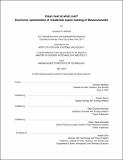Clean heat at what cost? Economic optimization of residential space heating in Massachusetts
Author(s)
McBride, Jameson R.
DownloadThesis PDF (9.531Mb)
Advisor
Martínez, Pablo Dueñas
Tapia-Ahumada, Karen
Terms of use
Metadata
Show full item recordAbstract
Electrifying space heating is a key strategy to reduce greenhouse gas emissions from buildings. The Commonwealth of Massachusetts has adopted a statutory target of net-zero emissions by the year 2050, and the state has predicted that 100,000 homes must be converted each year to electric space heating to reach a state-wide net-zero trajectory. Current progress is inadequate, as fewer than 1,000 homes per year have electrified space heating in Massachusetts in recent years.
This thesis analyzes the prospects and preconditions for the electrification of space heating in the Massachusetts single-family housing stock using an agent-based building optimization model built upon high-resolution building characteristics and a novel heat pump cost estimation methodology.
We argue that widespread heating electrification of existing homes in Massachusetts is unlikely to be economically optimal for households without significant policy change. In particular, the results of our modeling suggest that air-source heat pumps are significantly costlier to operate for primary space heating relative to high-efficiency natural gas furnaces and boilers under current electricity and natural gas rates. Making heating electrification economic for households would require substantially expanding operational subsidies or reforming rate design to reduce the price ratio of electricity to natural gas. Finally, we find that the electrification of space heating could reduce building CO2e emissions in Massachusetts by 25-35% under current grid carbon intensities.
Date issued
2022-05Department
Massachusetts Institute of Technology. Institute for Data, Systems, and SocietyPublisher
Massachusetts Institute of Technology